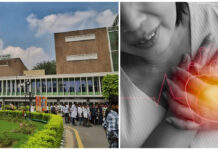It is very much clear that Hypertension is not a disease but an imbalance of systolic and diastolic heart beating rate. The normal blood pressure is 130/80 mm Hg. Blood pressure is high if it is greater than 130/80 mm Hg it means the blood pressure force on the arteries is high (Hypertension in Pregnancy).
Doctors usually say that one is at higher risk for gestational hypertension. This often occurs when the blood pressure rises in the second half of the pregnancy.
When one suffers from high blood pressure during pregnancy can cause complications for mother and child both. Let us see the health issues that may occur and what can be done to reduce the risk.
Reasons for Hypertension in Pregnancy
Gestational hypertension is fairly common in pregnant women. One is at greater risk if:
- One is undergoing the process for the first time.
- If age is 40 or more
- If one is overweight or obese, before the pregnancy
- If carrying fetus is more than one.
Types of Hypertension in Pregnancy During Pregnancy
Each body behaves differently, sometimes high blood pressure exists before pregnancy and there are also cases in which the high blood pressure develops during pregnancy.
- Gestational hypertension.The condition in which the women have high blood pressure after 20 weeks of pregnancy. Protein in the urine may not be in excess or other signs of organ damage. Some women with gestational hypertension eventually develop preeclampsia (having a high level of protein in their urine and also swelling in the feet, legs, and hands).
- Chronic hypertension.The condition of women in which the high blood pressure was present before pregnancy or occurs before 20 weeks of pregnancy. But because high blood pressure doesn’t have critical symptoms so it becomes difficult to determine when it began.
- Chronic hypertension with superimposed preeclampsia. This condition exists in women with chronic hypertension before pregnancy. The combined effect of high blood pressure and protein in the urine or other blood pressure-related complications during pregnancy.
- This condition occurs when hypertension develops after 20 weeks of pregnancy and is linked with signs of damage to other organ systems, including the kidneys, liver, blood or brain. Untreated preeclampsia can lead to serious and fatal complications for mother and baby as well, including development of seizures
Risk of Hypertension in Pregnancy During Pregnancy
- Decreased blood flow to the placenta.If the placenta lacks in getting enough blood, baby will definitely receive less oxygen and fewer nutrients. This will lead to stunted growth (intrauterine growth restriction), low birth weight or premature birth. Prematurity can lead to breathing problems, increased risk of infection and other complications for the baby.
- Placental abruption. Preeclampsia increases the risk of this condition in which the placenta separates from the inner wall of your uterus before delivery. Severe damage can cause heavy bleeding, which can be life-threatening for both mother and baby.
- Intrauterine growth restriction. This might result in slowed or decreased growth of the baby (intrauterine growth restriction).
- Injury to other organs. Poorly controlled hypertension can result in injury to brain, heart, lungs, kidneys, liver and other major organs. In severe cases, it can be life-threatening too.
- Premature delivery. Sometimes an early delivery is done to prevent potentially life-threatening complications when one has high blood pressure during pregnancy.
- Future cardiovascular disease. Having preeclampsia might increase the risk of future heart and blood vessel (cardiovascular) disease. The risk of future cardiovascular disease is higher if one has preeclampsia more than once or had a premature birth of the baby due to having high blood pressure during pregnancy.
Identification of Hypertension in Pregnancy
Regular monitoring of blood pressure is an important part of prenatal care. If one has chronic hypertension then with continuous measurements one will have-
- Elevated blood pressure. If the blood pressure is high then a systolic pressure ranging from 120 to 129 mm Hg and a diastolic pressure below 80 mm Hg. This tends to get worse over time unless precautionary steps are taken to control blood pressure.
- Stage 1 hypertension-A systolic pressure ranging from 130 to 139 mm Hg or a diastolic pressure ranging from 80 to 89 mm Hg.
- Stage 2 hypertension- More severe hypertension, having a systolic pressure of140 mm Hg or higher or a diastolic pressure of 90 mm Hg or higher.
After 20 weeks of pregnancy, if blood pressure exceeds 140/90 mm Hg, observed two or more times, within a gap of 4 hours, without any other organ damage, then it is considered to be gestational hypertension.
Precautions to reduce Hypertension in Pregnancy
One should take good care of self For example:
- Regular prenatal appointments. Visit health care provider regularly throughout pregnancy.
- Take blood pressure medication as prescribed.Health care supplier will lay down the safest medication at the most suitable dose.
- Stay active. Follow the health care provider’s recommendations for physical activity.
- Eat a healthy diet. Eat a good and healthy diet.
- Be away from bad habits. Avoid smoking, alcohol and illicit drugs.
Talk to health care providers before taking over-the-counter medications.
Work on Self to be Healthy and Avoid Hypertension in Pregnancy
Although it is not possible to prevent gestational hypertension, one can do everything to keep self and the baby as healthy as possible throughout pregnancy. A healthy lifestyle will help one to control blood pressure. And if you work according to the instructions of a doctor, then one can overcome the problems easily.
Consult doctor. As soon as one conceives, see the doctor immediately. And be sure to go to all your scheduled prenatal appointments. Discuss ways to overcome problems from high blood pressure.
Doctor will monitor the blood pressure throughout pregnancy and may also suggest monitoring it at home. The doctor will also check for other changes in the body. For example, if protein in urine is found then one have gestational hypertension which may turn into a more serious condition, preeclampsia.
Take prenatal vitamins. As a new person is growing inside, one needs more nutrients during pregnancy. According to some studies, two of these nutrients, folic acid and calcium may lower the risk for gestational hypertension. Whether or not that’s true, one should take a prenatal vitamin every day that contains these two nutrients, among others. This helps prevent birth defects and helps keep mother and baby healthy.
Eat healthy foods. Make sure the foods one chooses are nutritious. Try consuming fruits, veggies, whole-grain bread, lean meats, and low-fat dairy products on your plate every day. Ask the doctor whether one should lower salt intake. And learn what a healthy weight gain is for one during pregnancy.
Get moving. Exercise is one key to a healthy pregnancy. But consult a doctor for the kind of exercises one can proceed with. There may be limits on what one can do.
Avoid alcohol and cigarettes. It is best to give up altogether both things. Smoking and drinking alcohol is not at all good. But, quitting will surely give the chances for a healthy baby.
Labor and Delivery During Hypertension in Pregnancy
Your health care provider might suggest inducing labor before one’s due date to avoid complications. The timing of induction is based both on how well-controlled the blood pressure is, whether one has end-stage organ damage, and whether baby has complications, such as intrauterine growth restriction due to hypertension.
If have preeclampsia with severe features, one might be given medication during labor to help prevent seizures.
Breast-feeding the Baby During Hypertension in Pregnancy
Breast-feeding is encouraged for most women who have high blood pressure, even those who are on medication. But one has to discuss medication adjustments to be made with the health care provider before the baby is born. Sometimes an alternate blood pressure medication is recommended.
“Prevention Is Better Than Cure”

























